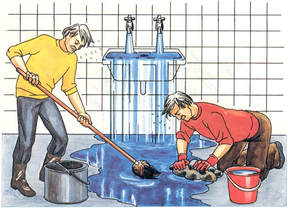Dr. Denis Burkitt F.R.S. (1911 - 1993) explains that the diseases we mostly suffer and die from in the West can be prevented by eating good food.
Here is an extract from the talk given by Dr Burkitt in honour of Surgeon Captain T L Cleave, at the November 1988 conference of the McCarrison Society for Nutrition and Health.
Here is an extract from the talk given by Dr Burkitt in honour of Surgeon Captain T L Cleave, at the November 1988 conference of the McCarrison Society for Nutrition and Health.
" Curative medicine is enormously valuable for sick people, but has almost no influence on the health of a community. With the exception of a few highly contagious diseases no disease is reduced in frequency by improving the quality of treatment. You don't get fewer dental caries because you fill teeth, you don't get less arthritis of the hip because you put in prostheses, you don't get less coronary heart disease because you do coronary by-pass surgery. To reduce disease you have got to deal with causes.
Consider an engine standing out in the adverse environment of rain and snow. As a result the parts are getting corroded and rusty and eventually the engine stops. What do we do? We call in the experts with all their equipment and knowledge hoping they will diagnose the fault and put it right. This they do and send a bill and you pay a cheque, the engine runs well, everyone is happy for the time being; but if it is left out in the environment which has caused the trouble in the first place the whole process is repeated again.
Now consider the same engine put under cover. It is protected from the rain. It is no longer getting wet, it is running beautifully, the driver is delighted although I doubt whether all the expert mechanics are delighted!
This is the approach we ought to take, rather than persistently treating symptoms or treating diseases without considering their cause.
Finally I want to emphasise again, the importance of preventive relative to curative medicine. We have grossly neglected the possibility of preventing disease
Consider an engine standing out in the adverse environment of rain and snow. As a result the parts are getting corroded and rusty and eventually the engine stops. What do we do? We call in the experts with all their equipment and knowledge hoping they will diagnose the fault and put it right. This they do and send a bill and you pay a cheque, the engine runs well, everyone is happy for the time being; but if it is left out in the environment which has caused the trouble in the first place the whole process is repeated again.
Now consider the same engine put under cover. It is protected from the rain. It is no longer getting wet, it is running beautifully, the driver is delighted although I doubt whether all the expert mechanics are delighted!
This is the approach we ought to take, rather than persistently treating symptoms or treating diseases without considering their cause.
Finally I want to emphasise again, the importance of preventive relative to curative medicine. We have grossly neglected the possibility of preventing disease
|
Fix the shelf
Imagine a shelf fastened crooked on the wall. As a result the earthenware pots on it are sliding off and smashing on the floor. How could we deal with this predicament? One thing we could do would be to hire a world expert on pot repairs who has developed a new wonder glue. Magnificent results are obtained by his repair. Everybody looking on is happy and the happiest man of all is the chairman of the glue company whose profits are likely to rise rapidly. Then imagine a man coming in and doing something no one had ever considered before. He straightens the shelf. The pots no longer fall off. The world expert is out of business, everybody is miserable because they are going to make nothing on it and the chairman of the glue company is going into deep depression. But this is much better for the pots. And you and I are the pots. We would rather stay on the shelf than fall off and have the best orthopaedic surgeon in London to mend us after we had broken in pieces |
Don't just mop the floor: turn the taps off!
Alternatively, imagine water running from a tap. The basin is overflowing, the floor is flooded, and two gentlemen, highly dedicated, highly trained and motivated, have a sole purpose in life, to try and keep the floor dry. They spend ten, fifteen hours a day, mopping the floor but they do not turn off the tap. Now of course the water from the tap represents the cause of disease, the floods on the floor are the diseases filling our hospitals. Fifty years ago I spent five years as an undergraduate medical student learning how to mop floors, nobody told me anything about turning off taps. As soon as I graduated I went off and did higher diplomas in electronic mops, improved brushes and I spent nearly thirty years of my life mopping floors before I became aware of the importance and possibility of turning off taps.
Only by straightening the shelf and turning off the tap will we ever reduce our disease; never by improving the glue or the methods of mopping. I call to mind the comment made by the American poet Ogden Nash of Baltimore, who once said 'We are making great progress, but we are heading in the wrong direction.'" |

